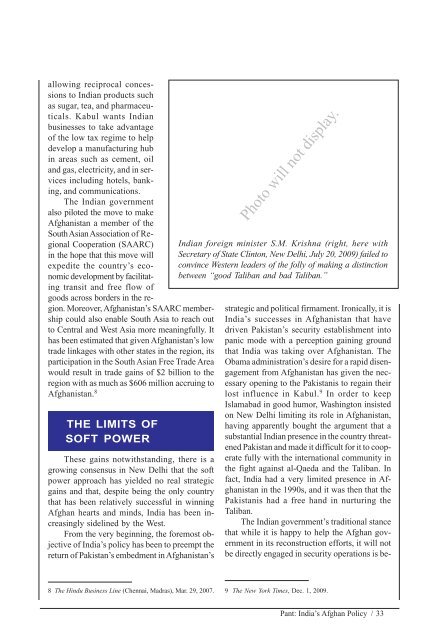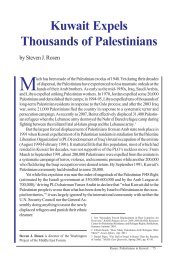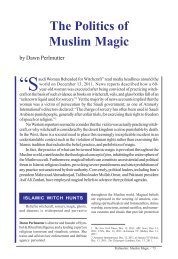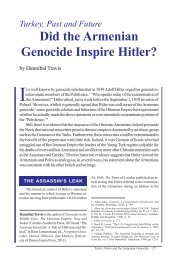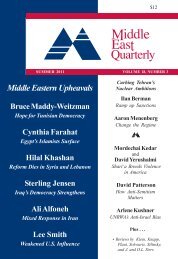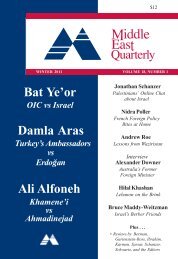etween Afghanistan and Pakistan, this bilateralrelationship is not hampered by the existence of acontiguous and contested border. For another,India’s support for the Northern Alliance againstthe Pakistan-backed Taliban in the 1990s strengthenedits position in Kabulafter 2001 as many Alliancemembers have comeNew Delhi haspursued “soft to hold key governmentalor provincial posts.power” inNew Delhi has also doneAfghanistan, its best to restore the balancein its engagementsticking tocivilian rather with a range of differentthan military ethnic groups and politicalaffiliations in Afghanistanand has used its vo-matters.cal support for PresidentHamid Karzai, an ethnic Pashtun educated in India,to demonstrate its keenness to revive its closeties with the Pashtuns, on the one hand, and tosupport the Afghan government and thecountry’s economic and political restructuring onthe other. 5Broadly speaking, New Delhi has pursueda “soft power” strategy toward Afghanistan,sticking to civilian rather than military matters.In consonance with the priorities laid down bythe Karzai government, Indian assistance hasfocused on building human capital and physicalinfrastructure, improving security, and helpingthe agricultural and other important sectors ofthe country’s economy. The Indian governmentis building roads, providing medical facilities,and helping with educational programs in an effortto develop and enhance long-term Afghancapabilities.New Delhi has pledged some US$1.3 billionon various projects, emerging as the sixthlargest bilateral donor to Afghanistan. Importantinfrastructural projects undertaken by Indiansinclude the construction of electricity transmissionlines, the Salma Dam power project inthe Herat province, construction of the Afghanparliament building, helping in the expansion ofthe Afghan national television network, and severalsmaller projects in agriculture, rural development,education, health, energy, and vocationaltraining. The 218-kilometer Zaranj-Delaramhighway, enabling Afghanistan to have accessto the sea via Iran and providing a shorter routefor Indian goods to Afghanistan, was completedby India’s Border Roads Organization in 2008despite stiff resistance from the Taliban. A 300-strong paramilitary force provided by India ensuredthe safety of the Indian workers and allowedthe project to beat construction and monetarydeadlines. 6As a consequence, New Delhi has come toenjoy considerable influence in Afghanistan.Ordinary Afghans have welcomed Indian involvementin development projects in their country;Indian films and television programs are extremelypopular among the local Afghan populace,and India remains the favorite destinationfor Afghans with its embassy and four othermissions issuing around 350 visas daily. TheIndian government has a fundamental interestin ensuring that Afghanistan emerges as a stableand economically integrated state in the region.Though the Afghan economy has recovered significantlysince the fall of the Taliban with realgross domestic product growth rate exceeding 7percent in 2008 and exceeding 22 percent in 2009,it remains highly dependent on foreign aid andtrade with neighboring countries. 7 The only wayin which the flailing Karzai government can retainand enhance its legitimacy is by bringingthe Afghan economy back on track. For this, itlargely depends on other states, and New Delhiis playing an important role by laying the foundationsfor sustainable economic developmentin the country. A preferential Afghan-Indiantrade agreement gives substantial duty concessionsto certain categories of Afghan dryfruits when entering India with Afghanistan5 Agreement on Provisional Arrangements in Afghanistan Pendingthe Re-Establishment of Permanent Government Institutions(Bonn agreement), United Nations, Bonn, Ger., Dec. 5,2001.6 The Indian Express (New Delhi), Jan. 23, 2009.7 “Afghanistan,” The World Factbook, Central IntelligenceAgency, McLean, Va., Dec. 28, 2010.32 / MIDDLE EAST QUARTERLY SPRING 2011
allowing reciprocal concessionsto Indian products suchas sugar, tea, and pharmaceuticals.Kabul wants Indianbusinesses to take advantageof the low tax regime to helpdevelop a manufacturing hubin areas such as cement, oiland gas, electricity, and in servicesincluding hotels, banking,and communications.The Indian governmentalso piloted the move to makeAfghanistan a member of theSouth Asian Association of RegionalCooperation (SAARC)in the hope that this move willexpedite the country’s economicdevelopment by facilitatingtransit and free flow ofgoods across borders in the region.Moreover, Afghanistan’s SAARC membershipcould also enable South Asia to reach outto Central and West Asia more meaningfully. Ithas been estimated that given Afghanistan’s lowtrade linkages with other states in the region, itsparticipation in the South Asian Free Trade Areawould result in trade gains of $2 billion to theregion with as much as $606 million accruing toAfghanistan. 8THE LIMITS OFSOFT POWERThese gains notwithstanding, there is agrowing consensus in New Delhi that the softpower approach has yielded no real strategicgains and that, despite being the only countrythat has been relatively successful in winningAfghan hearts and minds, India has been increasinglysidelined by the West.From the very beginning, the foremost objectiveof India’s policy has been to preempt thereturn of Pakistan’s embedment in Afghanistan’sPhoto will not display.Indian foreign minister S.M. Krishna (right, here withSecretary of State Clinton, New Delhi, July 20, 2009) failed toconvince Western leaders of the folly of making a distinctionbetween “good Taliban and bad Taliban.”strategic and political firmament. Ironically, it isIndia’s successes in Afghanistan that havedriven Pakistan’s security establishment intopanic mode with a perception gaining groundthat India was taking over Afghanistan. TheObama administration’s desire for a rapid disengagementfrom Afghanistan has given the necessaryopening to the Pakistanis to regain theirlost influence in Kabul. 9 In order to keepIslamabad in good humor, Washington insistedon New Delhi limiting its role in Afghanistan,having apparently bought the argument that asubstantial Indian presence in the country threatenedPakistan and made it difficult for it to cooperatefully with the international community inthe fight against al-Qaeda and the Taliban. Infact, India had a very limited presence in Afghanistanin the 1990s, and it was then that thePakistanis had a free hand in nurturing theTaliban.The Indian government’s traditional stancethat while it is happy to help the Afghan governmentin its reconstruction efforts, it will notbe directly engaged in security operations is be-8 The Hindu Business Line (Chennai, Madras), Mar. 29, 2007. 9 The New York Times, Dec. 1, 2009.<strong>Pant</strong>: India’s Afghan Policy / 33
- Page 1 and 2: $12SPRING 2011 VOLUME 18, NUMBER 2T
- Page 3 and 4: SPRING 2011 VOLUME 18, NUMBER 2THE
- Page 5 and 6: The Afghanistan ConflictMission Cre
- Page 7 and 8: countries.” 5 Out of twentyfiveai
- Page 9 and 10: Photo will not display.Rather than
- Page 11 and 12: Tajik, Uzbek, and Hazara, known as
- Page 13 and 14: Taliban and the Islamist Haqqaninet
- Page 15 and 16: detrimental to any campaign. The ma
- Page 17 and 18: 47 Noah Feldman, What We Owe Iraq:
- Page 19 and 20: The Afghanistan ConflictReforming t
- Page 21 and 22: operations gave way to compellingth
- Page 23 and 24: whether religious, economic, social
- Page 25 and 26: Decentralization also imposesan obl
- Page 27 and 28: ernmental goods and services to the
- Page 29 and 30: Photo will not display.Burqa-clad A
- Page 31 and 32: wifery-based prenatal and childbirt
- Page 33: The Afghanistan ConflictIndia’s C
- Page 37 and 38: more autonomous foreign policy. The
- Page 39 and 40: 27 The Hindustan Times (New Delhi),
- Page 41 and 42: lateral political realignment. 35 F
- Page 43 and 44: Turkey’s Christiansunder Siegeby
- Page 45 and 46: new system of church-state relation
- Page 47 and 48: tion in Turkey by declaring his opp
- Page 49 and 50: efore firing his pistol. 38 BishopP
- Page 51 and 52: as an instrument of deal-makingwith
- Page 53 and 54: Turkish state minister Mehmet Aydø
- Page 55 and 56: Abbas vs. Obamaby Steven J. RosenHa
- Page 57 and 58: international community in supporto
- Page 59 and 60: Since the start of the Obama admini
- Page 61 and 62: Damascus on Trialby David SchenkerI
- Page 63 and 64: Hersh, if Washington had agreed to
- Page 65 and 66: 21 Reports of the judgment appeared
- Page 67 and 68: UTA airlines after Libya was found
- Page 69 and 70: NGOs vs. Israelby Ben-Dror YeminiOn
- Page 71 and 72: that news of an agreement leaks out
- Page 73 and 74: and a string of European states, in
- Page 75 and 76: DATELINEEgypt’s AntiquitiesCaught
- Page 77 and 78: DATELINEday. Antiquities represent
- Page 79 and 80: State and military industriesdomina
- Page 81 and 82: DATELINEAll Ahmadinejad’s Menby A
- Page 83 and 84: DATELINESadegh Zibakalam, 21 who re
- Page 85 and 86:
The Science and TechnologyRing. Fol
- Page 87 and 88:
DATELINELebanon’s Islamist Strong
- Page 89 and 90:
Outward manifestations ofmodernity
- Page 91 and 92:
minister’s militia, to serveas a
- Page 93 and 94:
REVIEWSBrief ReviewsThe Arab Public
- Page 95 and 96:
REVIEWSception. Their arguments are
- Page 97 and 98:
REVIEWSMiddle East that is experien


